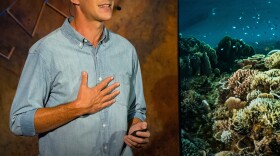
TED Radio Hour
Sundays at 3 PM
An idea is the one gift that you can hang onto even after you've given it away. Welcome to TED Radio Hour hosted by Guy Raz – a journey through fascinating ideas: astonishing inventions, fresh approaches to old problems, new ways to think and create.
Based on talks given by riveting speakers on the world-renowned TED stage, each show is centered on a common theme – such as the source of happiness, crowd-sourcing innovation, power shifts, or inexplicable connections – and injects soundscapes and conversations that bring these ideas to life.
-
This hour, journalist Saleem Reshamwala gives us a tour of surprising people and places — Lima, Nairobi, and prehistoric New Jersey — to inspire new perspectives on travel and cultures.
-
Artist Matthew Mazzotta says every community needs public spaces to gather, discuss, and address issues. He works with towns to reimagine overlooked buildings and give them a new public purpose.
-
Wikipedian Jake Orlowitz describes how volunteers update the world's largest encyclopedia. And co-founder Jimmy Wales says the site must not only be a neutral space, but one that encourages diversity.
-
Public places don't always fully meet the needs of a community. Shari Davis explains how participatory budgeting can give us all a voice in creating safer and more equitable public spaces.
-
Eli Pariser has an optimistic vision for our digital public spaces. He says that by structuring them like real-life parks, libraries, and town halls, we can create more welcoming, safe places online.
-
Legendary oceanographer Sylvia Earle has been exploring and working to protect our oceans for more than half a century. Her message has stayed the same: we're taking our oceans for granted.
-
In 1998, Alasdair Harris went to Madagascar to research coral reefs. He's worked there ever since. He explains the true meaning of conservation he learned from the island's Indigenous communities.
-
For marine biologist Ayana Elizabeth Johnson, not knowing where our seafood comes from isn't just a mystery—it's a problem. She says we should reconsider what we eat and how we take it from the sea.
-
Cone snails are deadly sea predators; their venom can kill fish and even humans. But chemical biologist Mandë Holford says that powerful venom can actually be used for good — to treat human diseases.
-
Marine biologist Ayana Elizabeth Johnson is obsessed with one research subject — the parrot fish. She says there is urgent work to be done to save them and their home, the coral reefs.










